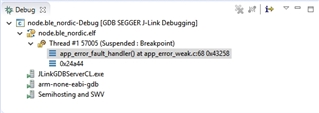Hi,
We are using a NRF52840 chip (SDK 15.3) in an application where we use the softdevice (S140) in combination with 2 UARTS: one for sending out debug output (UART0 - nrfx_uart), and another one for communication with another MCU.
During (internal) flash writes when doing bonding or garbage collection, the CPU stalls for quite a long time (~85 ms during flash erase). In order to make sure we do not lose data from the other CPU we have been looking into the 'nrf_libuarte_async' functionality.
It is constructed by using:
NRF_LIBUARTE_ASYNC_DEFINE(libuarte, 1, 1, NRF_LIBUARTE_PERIPHERAL_NOT_USED, 2, 512, 3);
(UARTE1, TIMER1 for byte counting, TIMER2 for timeout, buffer size of 512).
During normal operation it works fine, but after the CPU stall, we ofter end it in an error in 'nrf_libuarte_async_rx_free', stating "Unexpected RX free input parameter.". In this case the 'rx_free_cnt' is bigger than the 'chunck_size'. We are following the example of examples\peripheral\experimental_libuarte and free the buffer in the NRF_LIBUARTE_ASYNC_EVT_RX_DATA event.
Could you give any indication what can be the issue here? We couldn't find much documentation wrt to this driver.
Thank you.



